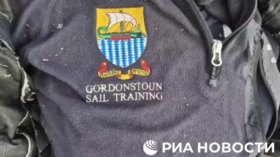Russian embassy ‘spy-nest’: British media brings its anti-Russia hysteria to Ireland

It hardly needs to be said that Ireland is a small country. But, for decades, it has had a newspaper industry to be proud of, with its main titles fairer and less partisan than their equivalents in other states.
Indeed, in Ireland we only needed to look across the water to Britain to see openly biased media in action, with papers either wedded to particular parties and ideologies or manipulated by their owners, depending on the circumstances of the day.
Over the past generation, British outlets have entered the Irish market, looking for circulation boosts to buttress numbers back at home. And, aside from their presence squeezing indigenous Irish operations, they’ve also brought with them the poor journalism standards of their homeland.
Take The Sunday’s Times’ (Ireland edition) splash on Dublin’s Russian embassy last weekend, for instance.
For some time now, Rupert Murdoch’s operation has been running an anti-Russia campaign in its UK edition. And one of its key ambitions is to have RT television banned from the British airwaves. This is largely because it’s funded by the Russian government and offers a non-mainstream perspective, which appears to infuriate the Australian-born media mogul and his London team.
While subscribers to the Times’ Irish offering have long been exposed to the “mainland” hysteria over Russia, its Dublin outpost only appeared to mount the “red-scare” horse with extra vigor in recent weeks, with sensationalist pieces concerning the activities of their embassy in our capital. Sadly, its coverage has been heavy on hyperbole and low on real Russia expertise.
I’ve worked from Russia for most of the last eight years and I have a significant understanding of how Moscow conducts its external affairs. Plus, my position here at RT gives me access to sources not available to any other Irish journalist.
Let’s be clear here, The Sunday Times’ latest wheeze, headlined "Russia uses firm with spy links for Dublin embassy job,” is a gigantic nothingburger. Largely because it’s trying to make Irish readers believe there is some sort of nefarious ‘KGB’ plot taking place in Dublin.
Sadly, for the conspiracy theorists, the reality is much less exciting. Basically, in common with most other large powers, Russia only uses its own nationals for projects at diplomatic buildings. This is because it fears hazards such as the installation of bugs or information on the lay-out being sold to hostile actors. As a result, the embassy is limited in its choice of contractors and any likely option will almost certainly have previously performed work for the military or special services. Which makes the status of the firm concerned “Zarubegproekt” neither surprising nor notable in itself.
That said, the company isn’t just any old construction firm either, it’s the Foreign Ministry’s official contractor and they would be the same outfit the London embassy, for example, would hire for a routine maintenance job. As an aside, Zarubegproekt has also designed the new block of the Tretyakov Art Gallery in Lavrushinsky Ln, Moscow, which means they are as linked to the art world as they are to the orbit of spooks.
The other element which has upset The Sunday Times is the large reconstruction job proposed for the Dublin building. And here the paper does have a point, because it envisages a lot of space for a country which, let’s face it, isn’t that high on Russia’s list of diplomatic priorities. And it is possible that some of the space could be used for espionage, something which other great powers like China and the United States are almost certainly also carrying out in Dublin, along with less important actors like the UK and France.
But the newspaper descends into the ridiculous with its focus on a planned basement in the property: more or less inferring the GRU/SVR (intelligence services) plan to install a spy nest in the Irish capital. And this betrays a rather obvious lack of understanding about how modern spy-craft works. Because the Russians, like their western rivals, have long moved on from the days where the personal touch is needed to procure information and nowadays most of their data is gleaned from cyber operations. Making The Sunday Times narrative a sort of quaint throwback to the heyday of John Le Carre or Ian Fleming.
Sources in Moscow tell me that all they are doing is bundling together the embassy and consulate and accompanying buildings into a single compound, with their London outpost to follow suit soon. As it happens, Irish visitors to Russia, and Russians in Ireland, will welcome this as the current consular and visa office isn’t fit for purpose. And, as for that basement? It’s standard practice, I am told, and will probably be used for a gym and storage, rather than a secret prison for GRU defectors.
As the Russian ambassador to Ireland, Yury Filatov, pointed out last week, Irish/Russian relations are very good. And, from personal experience, I can confirm that Irish people are well regarded here and Russians are fascinated by our country. Indeed, a big growth industry in recent years has been Irish pubs, which now appear even in small cities, thanks to the “Harats” chain, which has expanded them nation-wide. Meanwhile, Irish dancing has enjoyed a spurt of popularity recently, with schools opening up all over the place.
However, the appalling British/Russian relationship is the polar opposite: characterized by hostility, mistrust and a lack of respect, on both sides. But this has nothing to do with Ireland.
As a British publication, The Sunday Times has its own agenda in fostering antagonism towards Russia. Nevertheless, it would be better for Ireland if it didn’t spread its delirium to our shores. Thankfully, the indigenous Irish media has so far resisted this state of agitation, mirth and frenzy.
Think your friends would be interested? Share this story!
The statements, views and opinions expressed in this column are solely those of the author and do not necessarily represent those of RT.



















